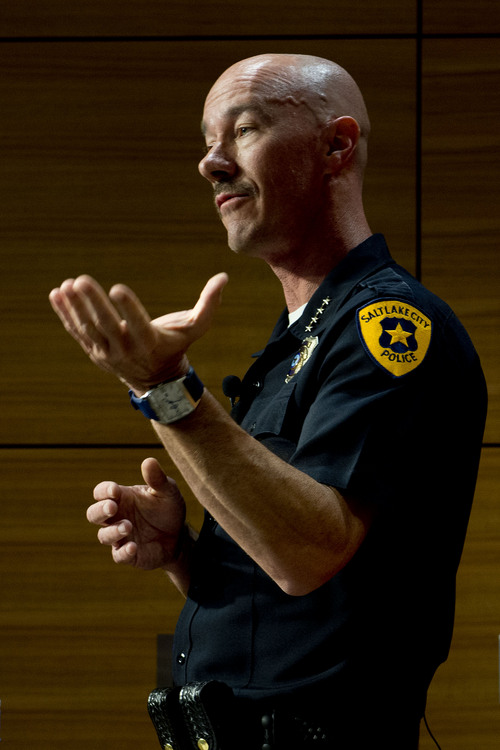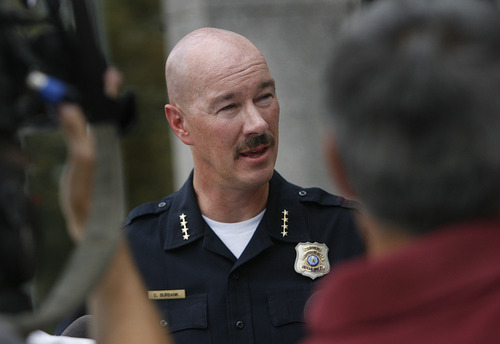This is an archived article that was published on sltrib.com in 2014, and information in the article may be outdated. It is provided only for personal research purposes and may not be reprinted.
The Salt Lake City Council is preparing to mandate that the administration of Mayor Ralph Becker and his police department change the way they handle sex-assault investigations by testing the forensic evidence from every reported case.
The unusual move is the next phase of a continuing and heated discussion that began last spring. During a tense April 15 work session, Councilman Kyle LaMalfa asked police Chief Chris Burbank why his department had not analyzed 788 of 1,001 Code R kits — or rape kits — containing forensic evidence from reported sex assaults between 2003 and 2011.
Burbank responded that analyzing all such rape kits is not an efficient use of funds or department personnel. In many instances such evidence is not useful, he said, if the suspect already has been identified.
Nonetheless, at its Tuesday 5 p.m. work session at City Hall, 451 S. State, the council will consider LaMalfa's proposal to require testing of all rape kits.
Many rape-victim advocates, including Holly Mullen, executive director of the Rape Recovery Center, say that analyzing all the Code R kits would be useful in identifying repeat rapists. In addition, when the kits aren't analyzed, she said, it leaves victims feeling that the justice system has turned its back on them.
LaMalfa's five-pronged initiative would take into account police training; processing of forensic data from Code-R kits; funding for the analysis; police reporting on the success rate of such investigations; and more frequent prosecution of suspects.
The debate was touched off by findings of Brigham Young University researchers Alyssa Lark and Julie Valentine that only 9 percent of reported rapes in Salt Lake County resulted in criminal charges from 2003 to 2011.
"I believe we can do better. Justice is not being served," LaMalfa said. "Society has to set the priorities for how law-enforcement resources should be focused. People are telling their elected officials, 'We got a problem.' "
Council Chairman Charlie Luke said that although it's uncommon for the city's legislative body to direct the administration on such protocols, it is within the purview of the council.
The work-session discussion also will include the officer-involved shooting death of 20-year-old Dillon Taylor outside a 7-Eleven store. Supporters say Taylor was unarmed but official details are sketchy as police continue a weeks-long investigation. Also a topic of controversy was the officer shooting of a dog, a Weimaraner named Geist.
"We want to know if the proper training is in place," Luke said. "Or if additional resources are needed."
David Everitt,Becker's chief of staff, said the administration welcomes a discussion on police protocols.
"The council has a job to do in terms of funding and giving high-level policy direction," he said. "This is within that range."
In August, Burbank announced that the Police Executive Research Forum would examine the Salt Lake City Police Department, among others, to determine best practices for investigation of sex assault nationwide.
In a Sept. 8 written communication to the City Council, Burbank sounded diplomatic, rather than combative: "The Police Department continually evaluates current practices and welcomes ideas that improve the way the department approaches all its operations. We look forward to continuing the conversation with the City Council and to a study of the Police Executive Research Forum so that Salt Lake City may better serve the public and, specifically, the victims of sexual assault."
An ad hoc work group made up of officials from public and private entities with help from the state Commission on Criminal and Juvenile Justice is devising a plan to analyze the backlog of more than 2,500 rape kits statewide.
The Utah Legislature earlier this year allocated $750,000 for the processing of unanalyzed kits throughout the state.
The work group recently designed a system to prioritize which of the kits to analyze first.
How that program will impact Salt Lake City has yet to be determined.





